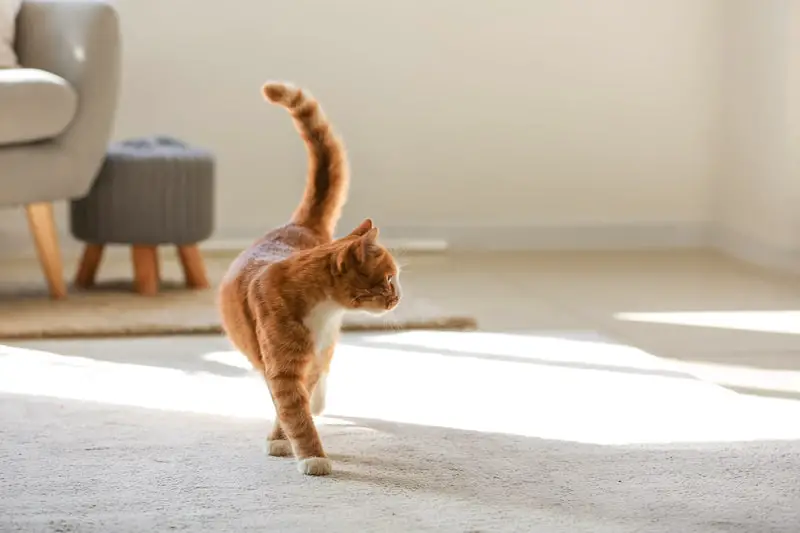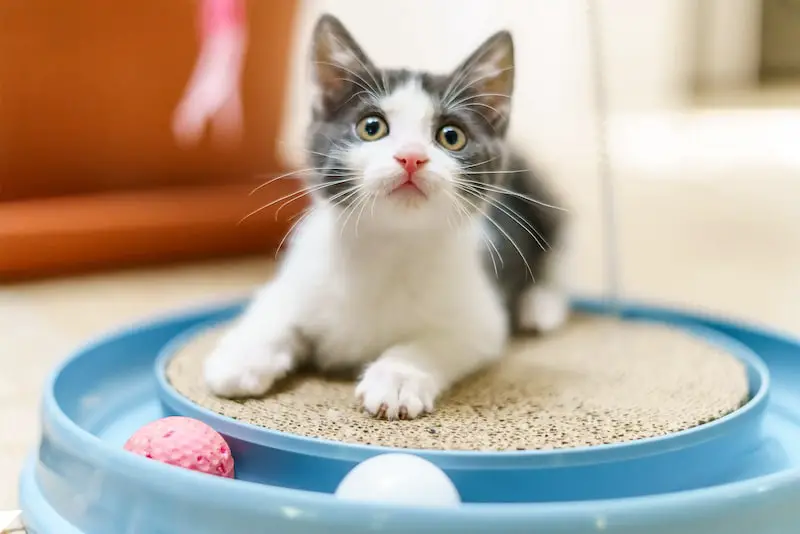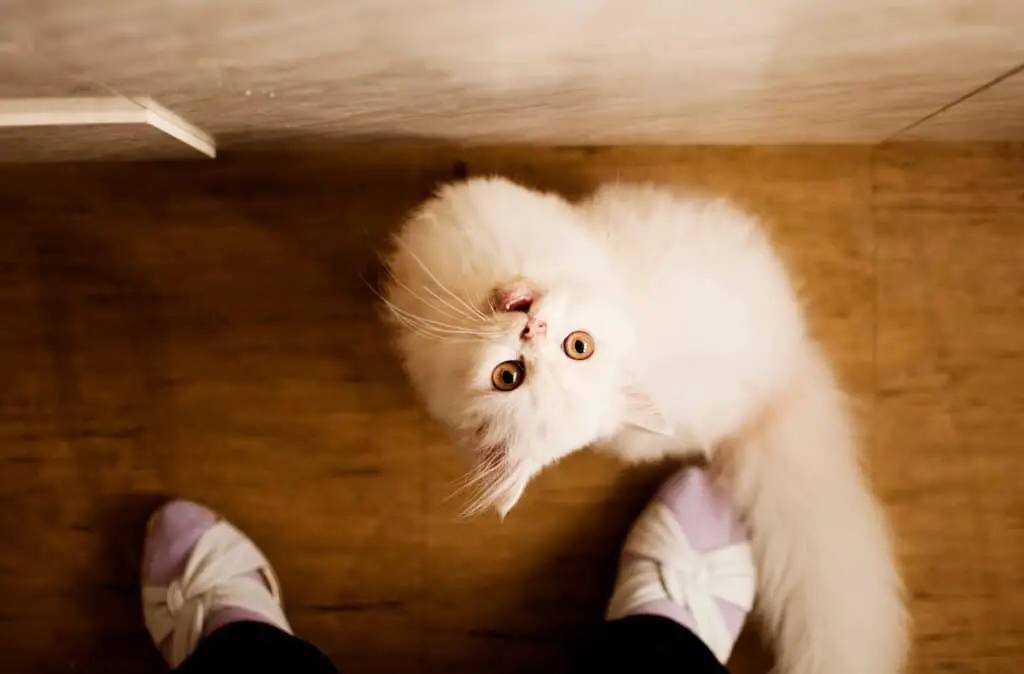Does your cat cry when you leave the house? Maybe even leave the room and close the door? This could very well be a case of cat separation anxiety. In this article we’ll go over the ins and outs of cat separation anxiety and how to alleviate your cat’s stress when you leave the house.
What is Cat Separation Anxiety?
Cat separation anxiety is a condition in which a cat experiences fear, anxiety, or stress when left alone or separated from their owner. This can manifest in various ways, such as excessive meowing or crying, destructive behavior, litter box problems, and even physical symptoms like vomiting or diarrhea.
What Causes Cat Separation Anxiety?

There is no single cause of cat separation anxiety, as it can be a combination of genetic and environmental factors. Some cats may have a genetic predisposition to anxiety or stress, while others may develop it as a result of a traumatic experience or a change in their environment.
Here are some of the more common causes of cat separation anxiety, and one or more of these might be the reason your cat cries when you leave the house:
- Sudden changes in alone time: If a cat is used to having their owner around all the time and suddenly has to spend long periods of time alone, they may become anxious and distressed.
- Some cats are just needier than others: They need to know where you are at all times and worry when you suddenly disappear. Another common example of this is if your cat cries at the door when you use the bathroom. They simply don’t want to be separated from you.
- Your cat may have been abandoned before: If your cat cries when you leave the house, they might be envisioning you leaving forever. Unfortunately, this has been an actual lived reality for a lot of cats who’ve been left at shelters. Cats left at shelters by their owners have been known to look for their owners for days, restlessly pacing around. It’s a really sad reality that a lot of cats live in, and if your cat was adopted they may be suffering from the trauma of abandonment.
- Changes in activity are getting your cat excited: The flurry of leaving the house (dumping items in your purse, putting on your shoes…forgetting something and running around to find it) can get your cat riled up. And cats meow loudly when they’re excited, so perhaps they’re just high energy by the time you head out the door.
- They’re upset you get to go outside and they can’t: If your cat frequently stares out the window and cackles at birds and leaves, they might have an infatuation with the outdoors. It’s possible that they’re crying when you leave the house because they’re upset that you get to go outside and they can’t. Even so, this is not a good reason to let your cat outside…the dangers of the outside world far outweigh your cat’s happiness.
Separation anxiety in cats is not fully understood, and it may be a combination of environmental and genetic factors influencing your cat crying when you leave the house.
How to Stop Your Cat From Crying When You Leave the House

Here are some tips for helping your cat feel more comfortable when you’re away:
- Practice Departure Rituals: Establish a routine that your cat will come to recognize and associate with your departure. This could include saying goodbye, providing a treat or toy, or playing a specific song or sound that signals it’s time for you to leave.
- Provide a Comforting Environment: Make sure your cat has access to plenty of comfortable places to rest and play while you’re away. Consider leaving a piece of clothing with your scent on it, such as a shirt or blanket, to provide your cat with a sense of security.
- Offer Distractions: Provide plenty of toys and activities for your cat to engage in while you’re away. Puzzle toys, interactive toys, and cat trees are great options to keep your cat entertained and distracted.
- Use Calming Scents: Certain scents, such as lavender or chamomile, can have a calming effect on cats. Consider using a plug-in diffuser or spray to release calming scents in your home.
- Consider Anti-Anxiety Medication: In some cases, medication may be necessary to help your cat cope with separation anxiety. Talk to your veterinarian about whether medication is a good option for your furry friend.
It’s important to remember that cats are individuals and what works for one may not work for another. Be patient and persistent in finding a solution that works best for you and your cat. With time and effort, you can help your cat feel more comfortable and secure when you’re away.
FAQS: My Cat Cries When I Leave the House
We’ve already included some tips on how to stop your cat from crying when you leave the house. I recommend trying some, if not all, of those tips. Including departure rituals, creating a comforting environment, offering distractions when you leave (like toys and catnip) are all ways to help your cat cope with separation anxiety. You can also try using calming scents or vet-prescribed anti-anxiety medications. If none of those work it might be worth considering getting another cat. Some cats are very social and need constant companionship, and a lonely cat can benefit from a kitty friend.
Cats, like humans, can experience separation anxiety when they are separated from their owners or their primary caretaker. Some common signs that your cat may be experiencing separation anxiety include:
– Excessive Meowing or Crying: If your cat meows or cries excessively when you leave the house, it may be a sign of separation anxiety.
– Destructive Behavior: If your cat is destructive when you’re not home, such as scratching furniture or chewing on things they shouldn’t, it may be a sign of anxiety or stress.
– Urinating or Defecating Outside the Litter Box: If your cat starts urinating or defecating outside the litter box, it could be a sign of stress or anxiety.
– Hiding or Avoiding Contact: If your cat becomes reclusive or avoids contact with you when you return home, it could be a sign of anxiety.
– Excessive Grooming: Cats may excessively groom themselves when they are anxious or stressed.
If you notice any of these signs in your cat, it’s important to consult with your veterinarian to rule out any underlying medical issues. They can also help you develop a plan to manage your cat’s separation anxiety and provide advice on behavior modification techniques or medications that may be helpful. With patience and a little bit of effort, you can help your cat feel more comfortable and secure when you’re away.
The answer to this question is: depends.
It’s not recommended to ignore a crying cat if they sound like they’re in deep distress or their meowing is out of the ordinary. Normally, ignoring a crying cat may cause them to feel neglected, which could impact their overall well-being and the bond they have with their owner. It can also cause them to become more anxious or stressed, which could exacerbate their behavior.
However, in some cases cats will cry for attention. In those cases, if you’re trying to train your cat to cry less, you might want to selectively ignore their cries. For example, if you always ignore your cat’s cries when you leave the house, but not when you’re sitting on the couch available for cuddles, it signals to your cat that there is a time and place for protest.
In the end, you want to make sure your cat gets plenty of love and attention. What you really want to avoid is consistent neglect.
Comforting a crying cat can be a challenge, but there are several things you can do to help your furry friend feel more secure and calm. Here are some tips on how to comfort a crying cat:
– Provide a Safe Space: Cats feel more secure when they have a safe and comfortable space to retreat to. Make sure your cat has access to a cozy bed or hiding spot where they can feel safe and secure.
– Offer Affection: Spend time with your cat and offer affection, such as petting, brushing, or cuddling. This can help your cat feel more relaxed and comforted.
– Play Soothing Music: Soft, calming music can help soothe a crying cat. Try playing some classical or instrumental music in the background to help calm your cat.
– Provide Comforting Scents: Cats respond well to familiar scents, so try placing a blanket or piece of clothing with your scent on it near your cat’s sleeping area.
– Use Pheromone Sprays or Diffusers: Pheromone sprays or diffusers can help calm and comfort cats. These products mimic the natural pheromones that cats produce when they are relaxed and content.
It’s important to note that comforting a crying cat may require patience and persistence. Every cat is different, and what works for one may not work for another. Be patient and try different techniques to help your cat feel more secure and comforted.














